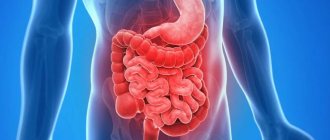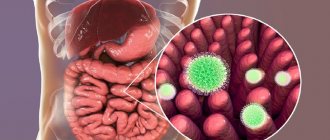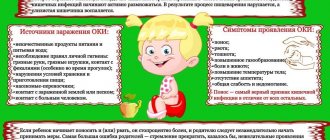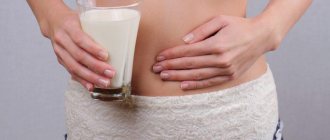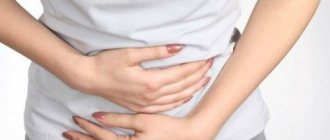Why does my stomach hurt?
The pain that occurs after eating is associated with the digestive system and indicates that there is a problem in some organ, but it is not always the stomach. The cause may be the gallbladder, liver, or intestines. Let's look at the common reasons.
The first signs that there was something wrong with the food appear after a few hours. Symptoms of poisoning depend on what was eaten and in what quantity. In addition to abdominal pain, nausea and vomiting, diarrhea, and weakness may occur. In severe cases, the temperature rises. Emergency medical attention is needed if symptoms are severe or if chemical poisoning is suspected.
This is abbreviated as GERD (gastroesophageal reflux disease). Its cause is weakness of the muscular sphincter between the esophagus and stomach. Acid stomach juice enters the esophagus and irritates its mucous membrane.
GERD is more common in obese people and is a concern when overeating or if you lie down after eating. Characteristic signs: heartburn, belching, discomfort when swallowing food.
With it, aching pain appears during meals or immediately after, and intensifies during fasting. Other symptoms: heartburn, belching, unpleasant taste in the mouth, periodic bowel disorders. With gastritis, the patient may complain of general weakness, drowsiness, irritability, and increased sweating during meals.
- Irritable stomach syndrome (IBS)
Most people experience this functional disorder from time to time. In this case, the person is worried about nausea, stomach cramps, flatulence and nagging pain. Food passes through the gastrointestinal tract more slowly or faster than normal, and stool disorders occur. Among the reasons: infections, nervous and hormonal disorders.
This is an inflammation of the pyloric region of the stomach and duodenum, in which the mucous membrane is inflamed and damaged, the motility of the gastrointestinal tract and the production of gastric juice are impaired. Gastroduodenitis is similar to IBS and gastritis in symptoms, but can also occur in an indirect form. There are several forms of the disease, and its consequences can be stomach bleeding and even the development of cancer.
- Stomach and duodenal ulcers
This is a lesion of the mucous membrane, which is manifested by the formation of ulcers due to infection with Helicobacter pylori. Pain from a peptic ulcer can be different in nature. They bother you constantly and are often worse on an empty stomach. They may have a permanent localization - in the left or right side of the abdomen, in the center (depending on where the ulcer formed). Additional symptoms: heartburn, sour belching, nausea after eating.
To digest this milk carbohydrate, our body must produce an enzyme - lactase. With its deficiency or absence, undigested lactose enters the small intestine, where it causes pain, bloating, and upset. You can suspect lactose intolerance by constant abdominal discomfort after drinking milk (less often, other dairy products).
What are the reasons for diarrhea and stomach cramps, and how to deal with it?
eceveryshop
Every person experiences unpleasant situations when their stomach turns. Often this is also accompanied by stool disorders and unpleasant sensations in the abdomen in the form of colic or bloating.
The causes of this condition may lie in poor nutrition.
But along with such a harmless provocateur of an unpleasant feeling in the stomach, there are also a lot of diseases that are accompanied by a similar symptom.
These symptoms should make you think about the presence of disorders in the digestive system of varying complexity. It is not necessary to sound the alarm, but it is worth observing the general condition and assessing the presence of additional symptoms.
In addition to the fact that this condition in itself is unpleasant, it also creates discomfort, which often affects the psychological state of a person, as he begins to feel awkward in society. It is very important for a person to know what reasons can provoke this condition, and when it is necessary to seek help from a doctor.
Harmless causes of this condition
In any case, if the stomach is twisting and diarrhea is observed, this indicates problems with the digestive system. They can be easily solved, or they can have quite serious roots. Very often a person has a twisted stomach due to poor nutrition.
The reasons are:
- Excessive consumption of food, which makes digestion difficult and parts of the food simply begin to ferment in the stomach. Then your stomach begins to rage, you may feel sick and experience intestinal upset.
- Eating incompatible foods that slow down digestion. This is the most common answer to the question why your stomach turns after eating.
- Eating a large amount of foods high in fiber also provokes gas formation, which often causes stomach pain and diarrhea.
- Minor intestinal infections enter the intestines, in which case rumbling occurs in the stomach and the stool becomes upset. If you also feel sick, an infection begins to develop.
- A sudden change in diet becomes stressful for the body, and the digestive system begins to react. A person often feels nauseous, feels bloated, etc. When your stomach hurts from an unhealthy diet, this can be easily solved by choosing a balanced diet. In this case, all symptoms go away within a few days. Proper nutrition is the key to the health of all digestive organs.
Important. Taking anti-diarrhea medications without a doctor's prescription is not recommended, as this may hide the symptoms and the disease will develop unhindered. In this case, it is possible to determine the pathology already at serious stages of the disease.
Pregnancy is often the cause of stomach cramps and diarrhea. This is due to hormonal changes and the need for the intestines to be cleansed faster to fully ensure the life of the baby in the womb.
In what cases should you sound the alarm?
Pathological causes of twisting are described by a fairly large list:
- Infection with helminths. In this case, the stomach turns, but there is no diarrhea.
- Acute appendicitis, which carries the danger that the organ may simply burst and cause peritonitis.
- Pancreatitis - inflammation of the pancreas at serious stages of complexity is also accompanied by unpleasant symptoms. Often it also makes you feel sick.
- Inflammation of the gallbladder can also cause diarrhea, stomach churning, and abdominal pain.
- Intestinal obstruction can often immediately have symptoms that are not dangerous at first glance. But in fact, this is a very serious disease that can only be eliminated surgically.
- Recurrent stomach ulcers also cause stomach cramping, but this often occurs after eating.
- Internal bleeding may occur without diarrhea, but severe, sharp, twisting pain is felt.
- The reasons may also lie in the presence of hernias on internal organs. At the moment they are pinched, unpleasant sensations such as colic and intestinal disorders appear.
- Serious gynecological diseases requiring acute intervention by specialists. These reasons include ectopic pregnancy, ovarian abscess, ruptured cysts, etc.
These are those serious illnesses that cause stomach cramps and require an urgent response. In all these situations, it is necessary to consult a doctor for qualified diagnosis and treatment. You should not try to eliminate unpleasant sensations on your own. All these conditions can be distinguished by the fact that they develop quickly and are accompanied by a group of aggravating symptoms.
Obviously, if you have stomach churning, diarrhea and nausea, you don't always need to call an ambulance, but if the condition worsens or causes too much discomfort and is in the form of acute pain, then it is better to seek help.
In other cases, dietary nutrition is the basis for eliminating the unpleasant condition. Experts also recommend undergoing preventive examinations with doctors in order to prevent the development of diseases and ensure confidence that the appearance of unpleasant sensations is not a signal of the presence of pathology.
You may also be interested in
Source: https://prosimptom.ru/az/krutit-zhivot.html
What to do if your stomach hurts
First, do not try to diagnose yourself. This is impossible, because the symptoms of many gastrointestinal diseases are similar, and the clinical picture can be blurred. Despite all the similarities, different diseases are treated differently. Don't take risks by guessing treatment and disease.
Secondly, remember as many details as possible about how, where, when and how long it hurts, what else is bothering you.
Thirdly, consult a gastroenterologist if the problem does not go away even after several days on a healthy diet. Don't delay consultation. The disease can develop rapidly, and the sooner you start acting, the higher the chances of recovery.
At the Kutuzovsky Children's Center we are always ready to help and carry out any examinations as quickly as possible. We invite you to a consultation at the clinic.
Source
Eating the wrong foods
Any digestive disorder is usually accompanied by diarrhea. But not always, it happens that there is no diarrhea. This can occur with physiological disturbances during the digestion of food. In this case, after eating, an unpleasant symptom appears - intestinal twisting, but without diarrhea.
Functional causes of abdominal cramps that occur without diarrhea:
- Overeating and eating incompatible foods can cause discomfort in the intestines in the form of bloating and seething.
- Consumption of foods that contain coarse fiber and contribute to increased gas formation (sauerkraut, beer, kvass, peas, beans, grapes, radishes).
- A mild food infection will cause a feeling of stomach churning. The entry of a pathogenic agent into the digestive tract, which the body is still able to cope with, will increase peristalsis and manifest itself in increased intestinal contractions without diarrhea.
- Neurological causes of abdominal discomfort. Sometimes the stomach turns in a stressful situation and with vegetative disorders.
- Pregnancy, in which functional rumbling in the abdomen is possible without much diarrhea. The reason is the gradual enlargement of the uterus, the position of the fetus and surges in progesterone production.
- The stomach turns when infected with helminths, but there is no diarrhea.
What to do in such cases? If after eating your stomach begins to churn and becomes bloated, you can alleviate the condition by taking a few tablets of activated charcoal. It is an excellent adsorbent and, if pathogenic microbes enter the intestines, it will have time to neutralize them. In addition to toxins, charcoal effectively binds gas bubbles, which cause rumbling in the intestines.
Taking Smecta and Enterosgel is effective and safe. These inert adsorbents perfectly bind and remove dangerous toxins from the body. Taking Espumisan will help cope with flatulence, which is often the cause of twisting pain in the abdomen.
What to do if there is a neurogenic cause of discomfort in the abdominal area? To begin with, it is very important to calm down. Normalizing the emotional background will have a positive effect on the intestines, spasms will pass and pain will go away.
Abdominal discomfort due to helminthic infestation disappears after effective antiparasitic therapy. Taking anthelmintic drugs is indicated not only for therapeutic purposes; periodic preventive courses of anthelmintic drugs can be carried out.
Causes of diarrhea immediately after eating
The digestion process involves many interconnected mechanisms, so when a problem occurs, the entire gastrointestinal tract (GIT) suffers.
The breakdown of food into smaller components is necessary for normal absorption of nutrients and microelements. The duration of a complete digestion cycle ranges from 1 to 3 days. This depends primarily on the characteristics of the products consumed, since each is absorbed over a different period of time. The balance of the functioning of internal organs is also important, the violation of which leads to the appearance of diarrhea immediately after eating.
First of all, loose stools immediately after eating food indicate a higher speed of its movement through the gastrointestinal tract. This leads to the fact that the products do not have time to break down, that is, the absorption of necessary substances suffers.
Diarrhea after eating occurs for the following reasons:
| Domestic | External | Diseases |
|
|
|
The difficult living conditions in the modern world cause constant tension, leading to stress. At the same time, the nervous regulation of all organs and systems, including the digestive tract, suffers - irritable bowel syndrome. Moreover, diarrhea can bother a person temporarily (for example, a student’s anxiety during exams) or become chronic. In the latter case, more serious diseases are expected to develop.
Many tourists encountered diarrhea as a problem of adaptation to the new climatic and geographical conditions of another country. This condition usually lasts about 3 days and does not require specific treatment.
If severe diarrhea occurs after each meal, this may also indicate a violation of the gastrointestinal microflora. Bacteria that normally inhabit the intestines are actively involved in the digestion of food, so when their ratio changes, loose stools occur, as the body tries to quickly get rid of poorly digested food.
In case of poisoning, in particular from poor-quality products, diarrhea usually goes away after a few days. However, missing food may contain pathogens of dangerous toxic infections (salmonellosis, dysentery), so if the patient’s condition worsens, you should immediately consult a doctor.
Enzyme deficiency is a congenital condition in which the human body is unable to break down substances (usually proteins). A typical example is celiac disease (the inability to digest grains containing gluten) or milk intolerance.
Chronic and allergic diseases also often lead to diarrhea after eating, however, with adequate treatment of the underlying pathology and following the doctor’s recommendations, this does not happen.
Abdominal pain due to pancreatitis
The first signs of pancreatitis are abdominal pain and profuse diarrhea. In the chronic form of the disease, bowel dysfunction appears due to the development of pathologies of the pancreas, so there is no need to look for the causes of diarrhea in external stimuli (poor quality food or environmental influences). Chronic pancreatitis stimulates the launch of degenerative processes and disruption of the normal processing of substances necessary for the body that enter it with food.
In patients with pancreatitis, diarrhea and cramps begin one to two hours after the feast. Often these symptoms, as well as nausea followed by vomiting, overtake a person who has developed pancreatitis at the mere smell or mention of fatty foods.
Clinical picture
Despite the fact that almost every person has encountered diarrhea in their life, it can manifest itself in completely different ways. First of all, it depends on the cause of this condition, so making a diagnosis for seemingly ordinary diarrhea can already solve half the problem. This is necessary to choose the most effective treatment tactics when visiting a doctor.
Diarrhea after eating in an adult can be accompanied by the following symptoms:
- Abdominal pain of varying localization, intensity and character;
- nausea, vomiting, belching, or heartburn;
- Increased body temperature;
- Dizziness, fainting;
- The appearance of pathological impurities in feces (blood, mucus);
- Severe weakness, pain in muscles and joints.
If at least two of the above symptoms appear, you should immediately go to a medical facility. This often indicates the development of severe poisoning, an infectious or inflammatory disease.
The nature of the stool can indicate the approximate location of the problem in the gastrointestinal tract. The following features cannot be ignored:
The stool has acquired a yellow tint - hologenic diarrhea (more often occurs after removal of the gallbladder or partial resection of the intestine);- A greenish tint to the stool against a background of fever, nausea, vomiting and abdominal pain usually occurs with the development of an infectious lesion (salmonellosis);
- Discoloration of feces occurs when there is obstruction (blockage) of the biliary tract or severe impairment of the liver. Usually accompanied by hepatic colic and high fever;
- Black or red stool indicates the presence of a source of bleeding in some part of the gastrointestinal tract.
When contacting a qualified specialist, it is important to speak honestly about what happened, clearly stating all complaints. It is also advisable to note the time when loose stool appears when going to the toilet.
Food allergies can be accompanied by the appearance of a rash on different parts of the body, redness, swelling, tearing, vomiting or a profuse runny nose.
Salmonellosis and frequent loose stools, nausea and abdominal pain
Salmonellosis is a disease belonging to intestinal infections. The source of its occurrence is pathogenic microorganisms, bacteria and viruses that enter the human body through the gastrointestinal tract. It is inappropriate to draw analogies between the deterioration of stool that occurs with food poisoning and intestinal infections. In the second case, the problem is hidden in the effects of viruses and harmful bacteria on the body, while in the first it is associated with food consumption. Salmonellosis has a long incubation period; its symptoms do not appear immediately, but only some time after the onset of the disease.
Treatment tactics
The scope of treatment measures is determined only by the doctor after examination, collecting complaints and conducting diagnostic studies. You can cope with the problem yourself only with mild diarrhea, which was not caused by a serious disruption of the functioning of the gastrointestinal tract.
Diagnostics
At the outpatient stage, the patient is most often required to perform the following prescribed studies:
- Detailed blood and urine tests;
- Coprogram (stool examination);
- Ultrasound of the abdominal cavity and pelvis;
- Colonoscopy;
- Sigmoidoscopy;
- Scraping for worm eggs;
- Survey radiography of the abdominal organs;
- Bacteriological examination of stool with determination of sensitivity to antibiotics;
- Virological examination of stool.
The results of the studies will allow the doctor to establish the correct diagnosis and begin treatment immediately.
First aid
In case of mild diarrhea, caused, for example, by eating poor-quality food, you can begin to help the patient yourself, following the following algorithm:
Provide plenty of fluids. With bowel movements, a person loses not only a lot of fluid, but also useful substances, so weakness and dehydration quickly increases (in advanced cases, it can be life-threatening). In this situation, it is important to replenish losses, for which they use non-carbonated mineral water, strong tea or special saline solutions - Regidron, Oralit.- Neutralize toxins that support the pathological process. The most commonly used absorbent preparations are Activated carbon, Smecta, Atoxil, Enterosorb. They act in just a few minutes, bringing relief to a person in a short period of time.
- Normalize microflora. Many types of digestive disorders require the use of probiotics as treatment or rehabilitation - Linex, Hilak-Forte, Bifidumbacterin.
If, after providing such assistance, the patient’s condition continues to worsen, then it is necessary to consult a doctor, especially if the body temperature increases or blood appears in the stool.
If diarrhea is infectious, a person is prescribed courses of antibacterial or antiviral drugs, the choice of which depends on the characteristics of the causative agent of the disease.
To improve a person’s neuropsychic status, the doctor may prescribe sedatives (in severe cases, antidepressants), and also advise changing lifestyle, normalizing sleep and rest patterns.
Pathological causes
More serious reasons may include the following:
- Pylorospasm is a spasm of the sphincter at the junction of the stomach and duodenum. Due to the spasm, it is difficult for food to move through the gastrointestinal tract, resulting in a feeling of heaviness, a “twisting stomach,” and nausea. This disorder is functional.
- Abdominal pain is caused by gastritis and stomach ulcers. With these diseases, the mucous membrane is damaged, that is, the sensitive reaction to irritating factors increases. The twisting in the stomach begins about an hour after eating.
- Another functional disorder is irritable bowel syndrome. This disease most often occurs against a background of stress and strong emotions. Associated symptoms include constipation, diarrhea, pain, discomfort, bloating or rumbling in the abdomen.
- Failure in the supply of nutritional enzymes or insufficient secretion in the gastrointestinal tract is also accompanied by pain symptoms. Enzymes are essential for digesting food, and when various diseases lead to their deficiency, digestion is impaired. Undigested pieces of food lead to intestinal irritation, resulting in pain and discomfort, while diarrhea may not occur.
- Acute intestinal obstruction is a rather serious illness. It occurs as a result of the appearance of some obstacle in the intestinal lumen, which entails increased motility.
- If a pregnant woman has a twisting stomach, but there is no diarrhea, then most likely it is an enlarged uterus pressing on the intestines or this is how the body reacts to an increase in progesterone in the woman’s blood. However, if severe pain and pathological vaginal discharge occur, then you should urgently seek the help of a doctor.
Eating the wrong foods
Any digestive disorder is usually accompanied by diarrhea. But not always, it happens that there is no diarrhea. This can occur with physiological disturbances during the digestion of food. In this case, after eating, an unpleasant symptom appears - intestinal twisting, but without diarrhea.
Functional causes of abdominal cramps that occur without diarrhea:
- Overeating and eating incompatible foods can cause discomfort in the intestines in the form of bloating and seething.
- Consumption of foods that contain coarse fiber and contribute to increased gas formation (sauerkraut, beer, kvass, peas, beans, grapes, radishes).
- A mild food infection will cause a feeling of stomach churning. The entry of a pathogenic agent into the digestive tract, which the body is still able to cope with, will increase peristalsis and manifest itself in increased intestinal contractions without diarrhea.
- Neurological causes of abdominal discomfort. Sometimes the stomach turns in a stressful situation and with vegetative disorders.
- Pregnancy, in which functional rumbling in the abdomen is possible without much diarrhea. The reason is the gradual enlargement of the uterus, the position of the fetus and surges in progesterone production.
- The stomach turns when infected with helminths, but there is no diarrhea.
What to do in such cases? If after eating your stomach begins to churn and becomes bloated, you can alleviate the condition by taking a few tablets of activated charcoal. It is an excellent adsorbent and, if pathogenic microbes enter the intestines, it will have time to neutralize them. In addition to toxins, charcoal effectively binds gas bubbles, which cause rumbling in the intestines.
Taking Smecta and Enterosgel is effective and safe. These inert adsorbents perfectly bind and remove dangerous toxins from the body. Taking Espumisan will help cope with flatulence, which is often the cause of twisting pain in the abdomen.
What to do if there is a neurogenic cause of discomfort in the abdominal area? To begin with, it is very important to calm down. Normalizing the emotional background will have a positive effect on the intestines, spasms will pass and pain will go away.
Abdominal discomfort due to helminthic infestation disappears after effective antiparasitic therapy. Taking anthelmintic drugs is indicated not only for therapeutic purposes; periodic preventive courses of anthelmintic drugs can be carried out.
Associated symptoms
To identify the reason why diarrhea occurs in an adult immediately after eating, you need to pay attention to the accompanying symptoms.
Loose stools may be accompanied by symptoms such as:
- belching, heartburn, gagging and nausea;
- pain syndrome localized in the abdominal area;
- hyperthermia;
- fainting and dizziness;
- stool contains mucus or blood;
- pain in the joints and muscles.
If several of these symptoms appear at once, you should go to the doctor without delay. They may indicate severe poisoning, the onset of an inflammatory process, or damage to the gastrointestinal tract by infection.


